| Listing 1 - 10 of 117 | << page >> |
Sort by
|
Book
Year: 1883 Publisher: Gent Stepman
Abstract | Keywords | Export | Availability | Bookmark
 Loading...
Loading...Choose an application
- Reference Manager
- EndNote
- RefWorks (Direct export to RefWorks)
Book
Year: 1876 Publisher: Gent Stepman
Abstract | Keywords | Export | Availability | Bookmark
 Loading...
Loading...Choose an application
- Reference Manager
- EndNote
- RefWorks (Direct export to RefWorks)
Book
Year: 1876 Publisher: Gent : Stepman,
Abstract | Keywords | Export | Availability | Bookmark
 Loading...
Loading...Choose an application
- Reference Manager
- EndNote
- RefWorks (Direct export to RefWorks)
Book
ISBN: 9781846144820 1846144825 Year: 2012 Publisher: London: Penguin books,
Abstract | Keywords | Export | Availability | Bookmark
 Loading...
Loading...Choose an application
- Reference Manager
- EndNote
- RefWorks (Direct export to RefWorks)
Across the world, we have more universities than ever yet are also increasingly sceptical about their value. "What are universities for ?" presents a spirited, compelling argument for rethinking the way we see these institutions, and why we need them. Stefan Collini challenges the idea that universities must show their contribution to economic growth ; instead, he argues, we must recognize the inherent worth of intellectual enquiry, and the complexity of harnessing this to immediate financial goals - particularly in the case of the humanities, which can seem the most difficult subjects to justify but may be among the most valuable. Collini's critiques of the higher education policies of successive governments are devastating but constructive. At a time when the future of higher education lies in the balance, this book offers us a deeper, more persuasive understanding of why universities matter - to everyone.
Higher education --- Universities and colleges --- Education, Higher --- Higher education and state. --- Universités --- Enseignement supérieur --- Philosophy. --- Aims and objectives. --- Aims and objectives --- Philosophie --- Finalités --- Politique gouvernementale --- Universités --- Enseignement supérieur --- Finalités --- Higher education and state --- Colleges --- Degree-granting institutions --- Higher education institutions --- Higher education providers --- Institutions of higher education --- Postsecondary institutions --- Public institutions --- Schools --- State and higher education --- Education and state --- Philosophy --- Government policy --- Universities and colleges - Philosophy --- Education, Higher - Aims and objectives. --- Education, Higher - Aims and objectives - Great Britain
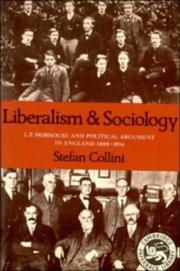
ISBN: 0521223040 0521274087 Year: 1979 Publisher: Cambridge Cambridge University Press
Abstract | Keywords | Export | Availability | Bookmark
 Loading...
Loading...Choose an application
- Reference Manager
- EndNote
- RefWorks (Direct export to RefWorks)
Political philosophy. Social philosophy --- Political sociology --- Hobhouse, Leonhard --- Great Britain --- Liberalism --- Political science --- Sociology --- Social theory --- Social sciences --- Liberal egalitarianism --- Liberty --- History --- Hobhouse, L. T.
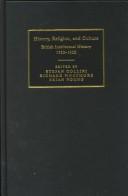
ISBN: 0521626390 0521626382 0511598483 0511837011 9780521626385 9780521626392 9780511598487 Year: 2000 Publisher: Cambridge: Cambridge university press,
Abstract | Keywords | Export | Availability | Bookmark
 Loading...
Loading...Choose an application
- Reference Manager
- EndNote
- RefWorks (Direct export to RefWorks)
Modern British intellectual history has been a particularly flourishing field of enquiry in recent years, and these two tightly integrated volumes contain major new essays by almost all of its leading proponents. The contributors examine the history of British ideas over the past two centuries from a number of perspectives that together constitute a major new overview of the subject. History, Religion, and Culture begins with eighteenth-century historiography, especially Gibbon's Decline and Fall. It takes up different aspects of the place of religion in nineteenth-century cultural and political life, such as attitudes towards the native religions of India, the Victorian perception of Oliver Cromwell, and the religious sensibility of John Ruskin. Finally, in discussions which range up to the middle of the twentieth century, the volume explores relations between scientific ideas about change or development and assumptions about the nature and growth of the national community.
Great Britain --- Grande-Bretagne --- Intellectual life --- Civilization. --- Religion. --- Vie intellectuelle --- Civilisation --- Religion --- 19th century --- 18th century --- 20th century --- Civilization --- Social Sciences --- Political Science --- Great Britain - Intellectual life - 18th century. --- Great Britain - Intellectual life - 19th century. --- Great Britain - Intellectual life - 20th century. --- Great Britain - Civilization. --- Great Britain - Religion.
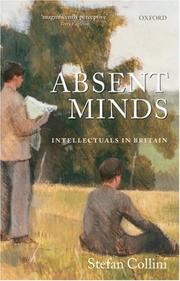
ISBN: 9780199216659 0199216657 9780199291052 Year: 2006 Publisher: Oxford : Oxford University Press,
Abstract | Keywords | Export | Availability | Bookmark
 Loading...
Loading...Choose an application
- Reference Manager
- EndNote
- RefWorks (Direct export to RefWorks)
A richly textured work of history and a powerful contribution to contemporary cultural debate, Absent Minds provides the first full-length account of "he question of intellectuals" n twentieth-century Britain--have such figures ever existed, have they always been more prominent or influential elsewhere, and are they on the point of becoming extinct today?Recovering neglected or misunderstood traditions of reflection and debate from the late nineteenth century through to the present, Stefan Collini challenges the familiar cliché that there are no "real" intellectuals in Britain. The book offers a persuasive analysis of the concept of 'the intellectual' and an extensive comparative account of how this question has been seen in the USA, France, and elsewhere in Europe. There are detailed discussions of influential or revealing figures such as Julien Benda, T. S. Eliot, George Orwell, and Edward Said, as well as trenchant critiques of current assumptions about the impact of specialization and celebrity. Throughout, attention is paid to the multiple senses of the term "intellectuals" and to the great diversity of relevant genres and media through which they have communicated their ideas, from pamphlets and periodical essays to public lectures and radio talks.
Intellectuals --- Intellectuels --- Great Britain --- Grande-Bretagne --- Intellectual life --- Vie intellectuelle --- 82:3 --- 82:3 Literatuur en maatschappijwetenschappen --- Literatuur en maatschappijwetenschappen
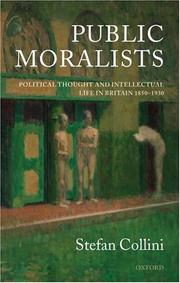
ISBN: 0198204221 9780198204220 Year: 2000 Publisher: Oxford : Clarendon press,
Abstract | Keywords | Export | Availability | Bookmark
 Loading...
Loading...Choose an application
- Reference Manager
- EndNote
- RefWorks (Direct export to RefWorks)
Intellectuals --- -Political science --- -Administration --- Civil government --- Commonwealth, The --- Government --- Political theory --- Political thought --- Politics --- Science, Political --- Social sciences --- State, The --- Intelligentsia --- Persons --- Social classes --- Specialists --- Attitudes --- -History --- History --- -Ethicists --- -Great Britain --- Great Britain --- Intellectual life --- -Intellectual life --- -Intellectuals --- Political science --- Ethicists --- Attitudes. --- filosofie --- Groot-Brittannië
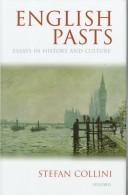
ISBN: 0198207808 9780198207801 Year: 1999 Publisher: Oxford: Oxford university press,
Abstract | Keywords | Export | Availability | Bookmark
 Loading...
Loading...Choose an application
- Reference Manager
- EndNote
- RefWorks (Direct export to RefWorks)
Nationalism --- Consciousness, National --- Identity, National --- National consciousness --- National identity --- International relations --- Patriotism --- Political science --- Autonomy and independence movements --- Internationalism --- Political messianism --- Historiography --- England --- Great Britain --- Angleterre --- Anglii︠a︡ --- Inghilterra --- Engeland --- Inglaterra --- Anglija --- England and Wales --- Civilization --- Historiography. --- Nationalism - England - Historiography. --- Great Britain - Historiography. --- England - Civilization - Historiography.
Book
ISBN: 9535161342 9535101609 Year: 2012 Publisher: IntechOpen
Abstract | Keywords | Export | Availability | Bookmark
 Loading...
Loading...Choose an application
- Reference Manager
- EndNote
- RefWorks (Direct export to RefWorks)
Copper has been used for thousands of years. In the centuries, both handicraft and industry have taken advantage of its easy castability and remarkable ductility combined with good mechanical and corrosion resistance. Although its mechanical properties are now well known, the simple f.c.c. structure still makes copper a model material for basic studies of deformation and damage mechanism in metals. On the other hand, its increasing use in many industrial sectors stimulates the development of high-performance and high-efficiency copper-based alloys. After an introduction to classification and casting, this book presents modern techniques and trends in processing copper alloys, such as the developing of lead-free alloys and the role of severe plastic deformation in improving its tensile and fatigue strength. Finally, in a specific section, archaeometallurgy techniques are applied to ancient copper alloys. The book is addressed to engineering professionals, manufacturers and materials scientists.
Copper alloys --- Metallurgy. --- Alloys --- Metals technology / metallurgy
| Listing 1 - 10 of 117 | << page >> |
Sort by
|

 Search
Search Feedback
Feedback About UniCat
About UniCat  Help
Help News
News